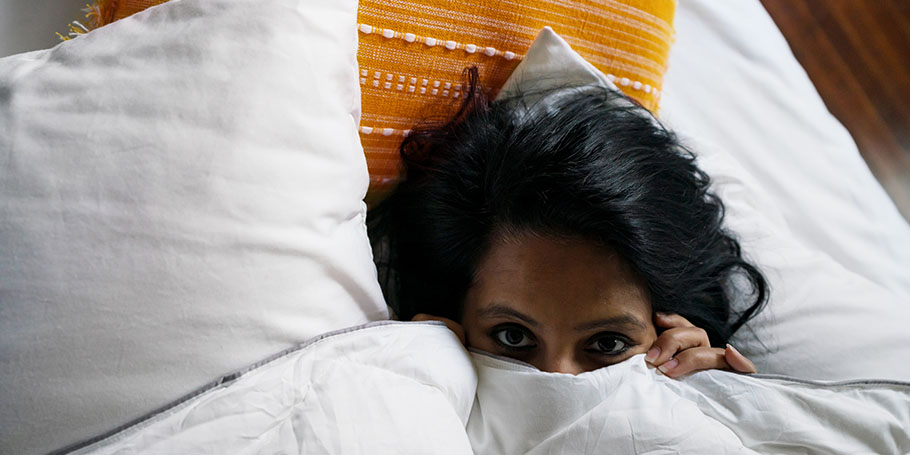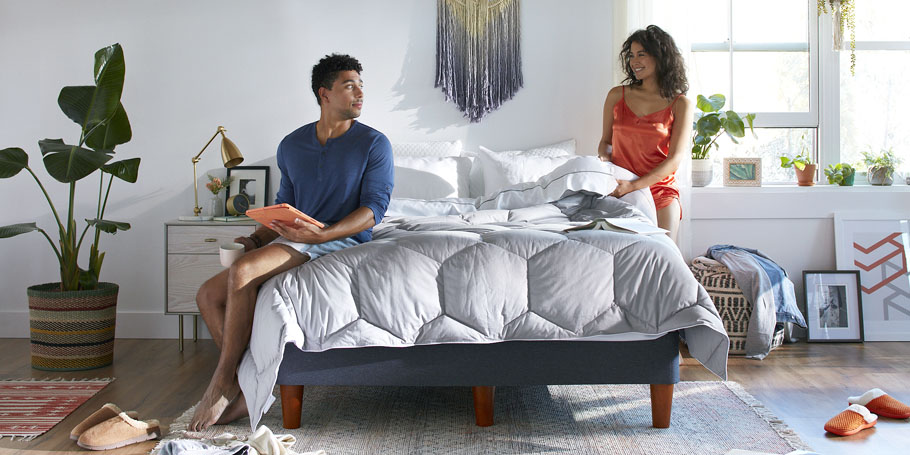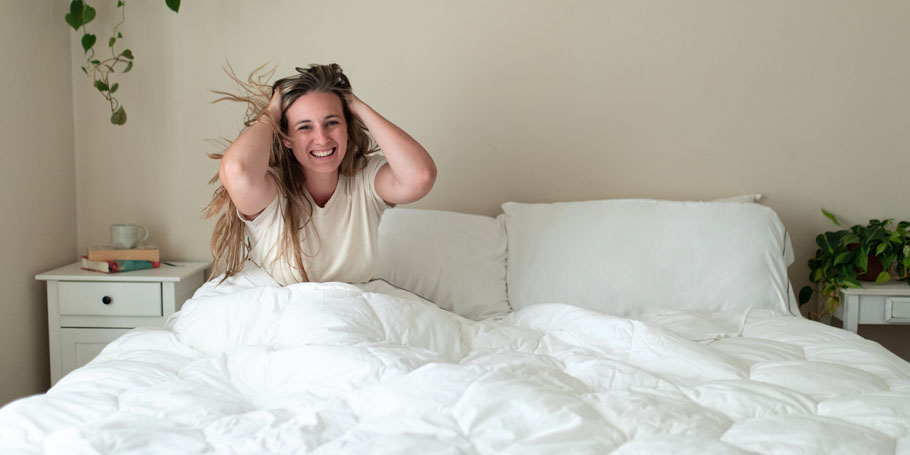A nocturnal panic attack can happen with no warning, leaving you wondering what caused it and why. If you’re often experiencing anxiety and chest pain at night, it’s likely a panic attack. A nocturnal panic attack typically only lasts for a couple of minutes, but it can make falling back asleep a challenge. We all know that getting enough sleep is important, but continuously having nocturnal panic attacks can seriously impact your quality of sleep.
In this article, we’ll be discussing nocturnal panic attack symptoms, what causes panic attacks, how to treat them, and more. It’s important to recognize your nocturnal panic attacks so that you can take the proper steps towards treatment.
- Nocturnal Panic Attack Symptoms
- What Causes Panic Attacks During Sleep?
- Treatment for Nocturnal Panic Attacks
- How to Cope With Panic Attacks at Night
- How to Prevent Sleep Anxiety and Panic Attacks
Nocturnal Panic Attack Symptoms
First and foremost: what is a panic attack? A panic attack is characterized by a sudden fear of disaster or of losing control, even when there is no danger present. An intense physical reaction usually accompanies a panic attack, and the feeling can often resemble a heart attack. A panic attack can happen anywhere, at any time.
So, can you have a panic attack in your sleep? Absolutely. When you have a panic attack while sleeping, you will most likely be woken up from it. It’s important to be aware of nocturnal panic attack symptoms so that you can be sure that what you’re experiencing is, in fact, a panic attack in your sleep.
Some nocturnal panic attack symptoms include:
- Chills
- Hot Flashes
- Muscle spasms
- Fear of death
- Chest pain
- Hyperventilating
- Nausea or stomach pain
- Numbness and tingling
- Fear of losing control
- Increased heart rate or palpitations
- Shortness of breath
- Sweating
- Shaking
- Feelings of being trapped
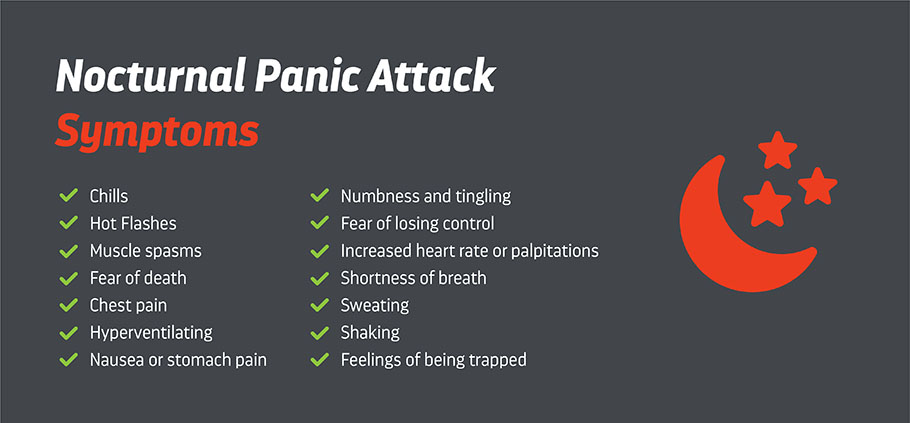
You can experience multiple of these symptoms at once or just a few. Having three or fewer of these symptoms would be considered a limited symptom attack. Regardless, both can be frightening situations to be in. The severity of the symptoms can vary, but many people describe it as feeling like a heart attack.
Nocturnal and daytime panic attacks have similar symptoms. If you have panic attacks during the day, you’re more likely to have a panic attack while sleeping. The only difference is that a nocturnal panic attack will wake you up out of your sleep. Once you have calmed yourself down from the panic attack, it can be difficult to fall back asleep. This can lead to insomnia, which is why it’s so important to be aware of your symptoms so that you can get the proper treatment.
What Causes Panic Attacks During Sleep?
Nocturnal panic attacks can be extremely frustrating to deal with. You’re being woken up to a panic attack with no idea of what caused it. It is hard to say what exactly triggers a panic attack during sleep, as it’s different from person to person. However, certain factors have been found to worsen anxiety, which can lead to panic attacks. Some of these factors include:
- Genetics
- Brain chemistry
- Underlying conditions like depression and social anxiety disorder
- High stress levels
- Traumatic life events
- Personality type
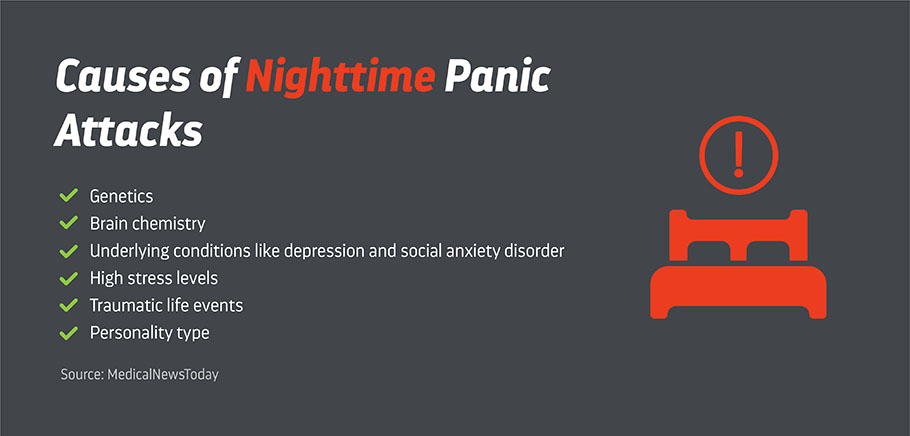
While we may not be able to pinpoint a specific cause of nocturnal panic attacks, we do know some factors that may trigger them. It is good to be aware of these factors so that you can take the necessary steps to treat them. It’s always a good idea to talk to your doctor so that you can try to find the root of your panic attacks.
Treatment for Nocturnal Panic Attacks
Finding treatment for nocturnal panic attacks is crucial for the sake of your health and wellbeing. Not only are these panic attacks frightening, they’re also detrimental to your sleep. Getting the proper treatment can improve your quality of sleep and help you live a healthier waking life.
Treatment for nocturnal panic attacks will usually involve medication and psychotherapy, such as cognitive behavioral therapy (CBT). CBT is a type of therapy that helps a person address their panic attack symptoms so they can find the root of the problem. Antidepressants can also help with treating nocturnal panic attacks. Antidepressants help by balancing the chemicals in your brain to improve your mood and lower anxiety. As with any medical decision, always consult with your doctor to determine the best course of action.
How to Cope With Panic Attacks at Night
When you wake up in the middle of the night to a panic attack, you’re probably feeling overwhelmed and lost as to what to do. Having a panic attack can be a terrifying experience, so it’s crucial to find effective coping mechanisms to help calm you down and get you back to sleep. You should practice these methods before, during, and after a panic attack. Getting in the habit of regularly practicing coping mechanisms will help train your body to relax during a panic attack. Some effective coping mechanisms include:
- Taking deep and slow breaths
- Thinking positive thoughts
- Talking to a loved one
- Taking slow sips of water
- Practicing meditation
- Performing light exercises, such as walking or stretching
- Relaxing your jaw and shoulder muscles
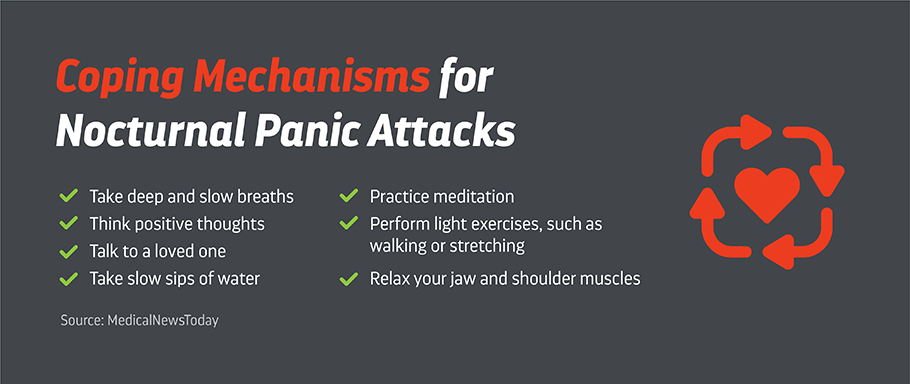
When you have a panic attack, one of the worst things you can do is fight it. A panic attack is your body’s natural reaction to fear, and fighting the feeling could just make things worse. Instead, let the panic attack come and go on its own. You want to relax as best as possible by breathing slowly and focusing on positive thoughts. It can be hard to fall back asleep after having a nocturnal panic attack, so don’t try to force yourself asleep. Do something to get your mind off of the panic attack and focus on something else. Your body will fall back asleep when it’s ready.
How to Prevent Sleep Anxiety and Panic Attacks
The last thing you want is your nocturnal panic attacks to become a frequent problem, which is why it’s so important to take the proper steps to prevent sleep anxiety and panic attacks. There are a few ways you can go about preventing panic attacks in your sleep, such as:
- Reduce screen time before bed: Avoid using electronic devices for at least 30 minutes before going to bed. The bright light emitted from screens can keep you awake, which can impact your quality of sleep.
- Sleep with a weighted blanket: A weighted blanket can help you feel more relaxed and calm while you sleep, thanks to Deep Touch Pressure that can decrease the chances of you waking up in a panic. The feeling of a weighted blank can help to calm the body and mind during periods of stress.
- Limit caffeine, alcohol, and sugar consumption before bed: Does caffeine affect sleep quality? Absolutely. Caffeine suppresses melatonin, which regulates your body’s natural sleep-wake cycle. Avoid drinking caffeine, alcohol, and sugar close to bedtime.
- Create a sleep routine: Nighttime routines are essential in getting a good night’s sleep. Having a bedtime routine can reduce the amount of stress and anxiety you feel before bed and keep your circadian rhythm in check. Your circadian rhythm is your internal clock that tells your body when to wake up, sleep, and eat.
- Get the right amount of sleep every night: You should aim for at least eight hours of sleep a night to ensure your body is well-rested. If you go to bed late, you may be nervous about not getting enough sleep, which can cause anxiety and lead to a panic attack. Instead, prioritize getting enough sleep every night. It’s also important to focus on getting deep sleep to restore the body and brain.
- Sleep at a comfortable temperature: You probably didn’t know that temperature has a big impact on your sleep. The best temp for sleeping is around 65 degrees Fahrenheit, but that differs for each person. Not finding the right temperature can make it hard to fall asleep, which can contribute to anxiety and insomnia. If you’re a hot sleeper, invest in a cooling mattress or cooling sheets to keep your body’s temperature regulated throughout the night.
- Have a comfortable mattress: Having a comfortable mattress is essential in getting a good night’s rest. A comfortable mattress will help you relax and fall asleep quicker. Just keep in mind that every mattress needs a mattress adjustment period, which is the time that it takes your body to get used to your new sleeping surface.
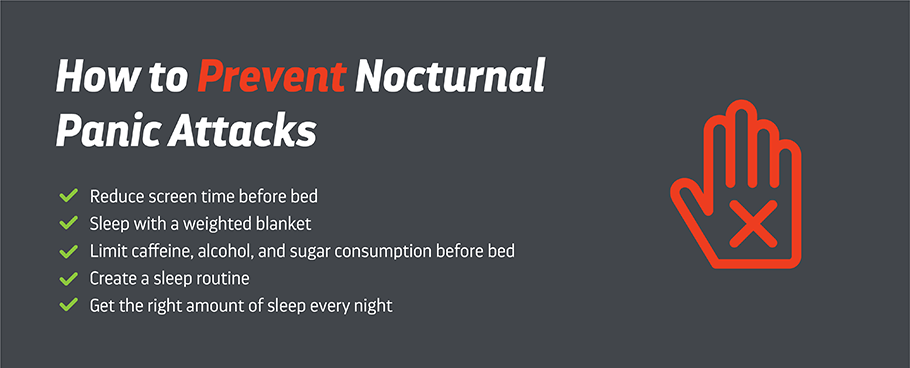
If you’re struggling with how to sleep with anxiety, it starts with practicing good sleep hygiene. There are many reasons why you should practice good sleep hygiene, such as improving your quality of sleep, reducing anxiety, and preventing the development of sleep problems. Preventing sleep anxiety and panic attacks means taking the necessary steps to practice good sleep hygiene. Now you know the importance of circadian rhythm, how to increase deep sleep, the benefits of having a nighttime routine, and more. Practice these methods, and you’ll find yourself relaxed and calm at night in no time.
Having a nocturnal panic attack is a terrifying experience that can significantly affect your day-to-day life. If you’re suffering from these nighttime panic attacks, Layla Sleep offers various products that can help you relax. Layla Sleep’s weighted blanket uses Deep Touch Pressure to reduce anxiety by applying a gentle, relaxing pressure across your whole body. Think of the weighted blanket as a comforting hug that helps you fall asleep and stay asleep. Does anything sound better than that? If you’re not sure how to choose a weighted blanket, check out our weighted blanket buying guide so you can pick one that works for you.

